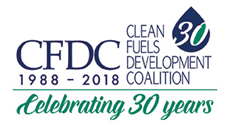
Recent reports that show worsening air quality in the U.S. can be attributed to hundreds of millions of gasoline vehicles on American roadways emitting significantly more harmful emissions than being reported, according to a new report released to Congress today at the Renewable Energy Expo.
Farmers Union Enterprises (FUE) released the Gasolinegate Report to Congress today asking for an investigation into why the U.S. Environmental Protection Agency’s Office of Transportation and Air Quality (OTAQ) is ignoring toxics in gasoline while delaying real world fuel and emission testing. This data could be critical to Congressional oversight as EPA is in the process of finalizing several new rules that will impact gasoline quality, vehicle efficiency, toxic emissions, greenhouse gases, and the development of alternative fuels for decades.
“We believe EPA/OTAQ continues to ignore the dangers of toxic carcinogenic aromatic compounds added to gasoline. Their actions are contrary to Congressional intent clearly written into the Clean Air Act Amendments of 1990 - and we want to know why,” said Farmers Union Enterprises Chairman Doug Sombke. “Emails obtained through the Freedom of Information Act cited in our Gasolinegate Report are part of a consistent pattern of EPA/OTAQ always siding with the petroleum industry in its rulings and interpretations, failing to recognize Congressional intent and failing to act in the public interest. Congress needs to help stop EPA from doing further harm and the needless loss of lives and money.”
The public service announcement video that accompanies the Gasolinegate Report chronicles the impact of three decades of flawed testing and emission calculations. The report cites dozens of reputable and peer reviewed studies confirming that ultrafine toxic particulates are one of the most serious public health threats in urban areas. A major source of these toxic pollutants come from the toxic aromatic additives in gasoline (i.e. benzene, toluene methylbenzene, ethylbenzene, and xylene dimethylbenzene, or BTEX). In 1948 the American Petroleum Institute stated the safe threshold for benzene is zero, but EPA still allows it in gasoline, said Sombke.
Emissions from unnecessarily high aromatic levels in gasoline have been linked to pre-term births, cancer, IQ loss, neurological disorders, and a multitude of respiratory diseases (see Fact Book: What’s in Our Gasoline Is Killing Us: Mobile Source Air Toxics and The Threat to Public Health.) A report by the Massachusetts Institute of Technology estimated 50,000 premature deaths are caused each year from transportation fuels. Gasoline is proving to be the most significant contributing factors, not diesel or Dieselgate, which only involved a half million cars while Gasolinegate involves more than 250 million cars.
FUE produced the Gasolinegate Report to help Congress determine why OTAQ has refused to update a critical cost benefit analysis to reduce toxics for the past 13 years and continues to side step a clear path to reducing toxics in gasoline to the “greatest extent possible” as required in the CAA. The report is available through FUE and the Clean Fuels Development Coalition (CFDC) as part of their SAFE Gasoline education campaign.
As we stressed in our comments on the pending fuel economy rulemaking, a simple and technologically achievable increase in the octane standard will allow conventional cars to increase mileage by as much as 5% and reduce greenhouse gases by 7%.,” said Doug Durante, Executive Director of CFDC.The result is a cleaner, safer fuel at a lower cost that all cars can benefit from,” he said.
Related research and information: Safe Gasoline Public Education and Consumer Awareness Campaign.






















